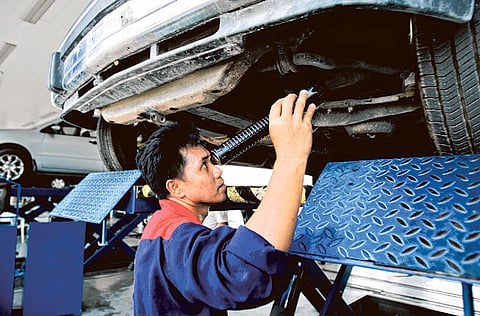Dubai's RTA moves to upgrade vehicle testing
Scaling up of technology and certification of technicians among proposed changes

Dubai: A comprehensive analysis of the vehicle testing system by a special team from the Roads and Transport Authority (RTA) has proposed a series of changes to the process of testing, which could force many unsafe vehicles off the roads, Gulf News has learnt.
Among the proposed changes are revised vehicle inspection parameters, upgraded equipment and a unified information technology (IT) system for testing centres that will come into effect in different phases from the beginning of 2013.
“We have completed a very comprehensive analysis of the vehicle testing system, looking at the process and technology currently in place and where are the areas that we can improve. We have done a lot of benchmarking with different cities and countries across the world. We have put a plan in place to implement the proposal of improvement,” said Ahmad Hashem Behroozian, CEO of the RTA’s licensing agency, revealing the details of the plan exclusively to Gulf News.
The initiative is part of RTA’s overall efforts to improve road safety and ensure the highest standards. “We are implementing more stringent safety standards at every level. The idea is to make Dubai roads safer and have in place international standards of inspection and testing,” Behroozian said.
Although wider parameters and stricter safety measures are designed for a comprehensive technical screening of vehicles, Behroozian insisted that the idea is not to impact people adversely. “Our intention is not to impact people adversely but we want higher safety standards. This could mean some vehicles which are currently on road may not pass, but a majority of vehicles registered in Dubai are in new and good condition,” he said.
The revised parameters will come into place from next year and will put the vehicle testing process on par with international standards.
Some of the key parameters that are currently looked into are vehicle identification numbers, brake system, steering and suspension, wheel and tyres, body condition, lighting and the engine compartment.
The broader parameters mean more areas will be looked into in terms of vehicle safety and GCC specifications.
From mid-2013, new testing equipment will be introduced at all testing centres and machines will play a major role in testing vehicles alongside technicians. “Machines will carry out most of the tasks, reducing the chances of human error and making doubly sure only safest vehicles enter the roads,” Behroozian said.
Among the proposed changes will also be a unified IT system for all vehicle testing centres, which will be owned by RTA and used by all the testing centres in Dubai.
Currently, all vehicle testing centres rely on individual IT sytems that are linked to RTA. In the new system, when the vehicle test is done, the data will automatically be entered in the RTA database.
“This will help a lot in the analysis of results, it will help us in controlling the kind of vehicles that enter the road,” Behroozian said.
Another key step in the revised testing process relates to the official certification of the technicians who carry out vehicle inspection.
The new system will ensure the technicians have a certain level of skills and they will have to undergo continuous training to make them familiar with the latest technologies used in vehicles.
As of November 2012, there were 1,127,332 vehicles registered in Dubai, around 80 per cent of which are less than five years old.
Currently, any vehicle that has completed three years since its first registration needs to be tested and re-registered annually. The testing is done by RTA authorised centres like Tasjeel or Al Shamil.
If a vehicle fails to meet any of the criteria, or if there is any thing wrong with any component of the car, the owner is told to repair or replace it. Once repairs are done, the examiner issues a pass certificate, following which the car is registered for a period of one year.
Sign up for the Daily Briefing
Get the latest news and updates straight to your inbox


